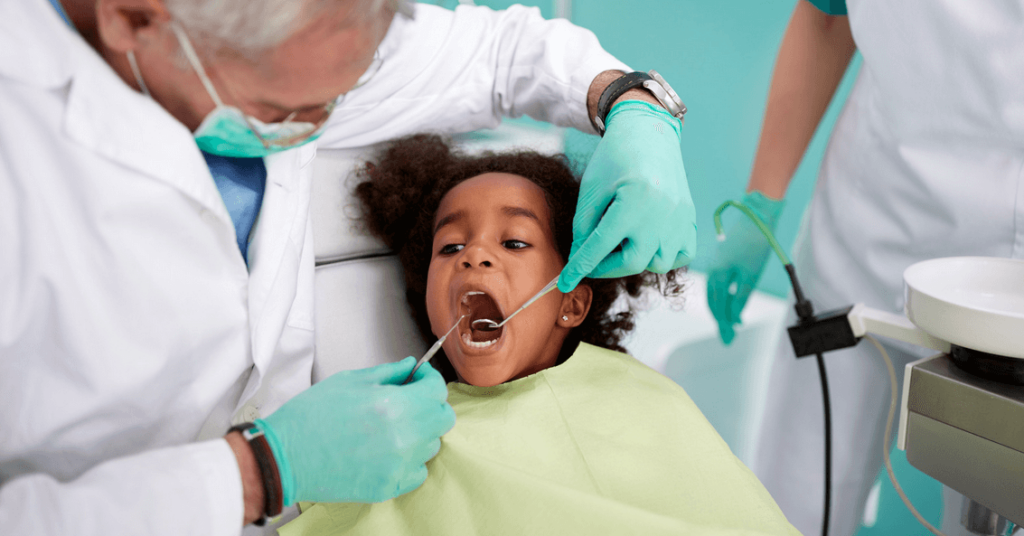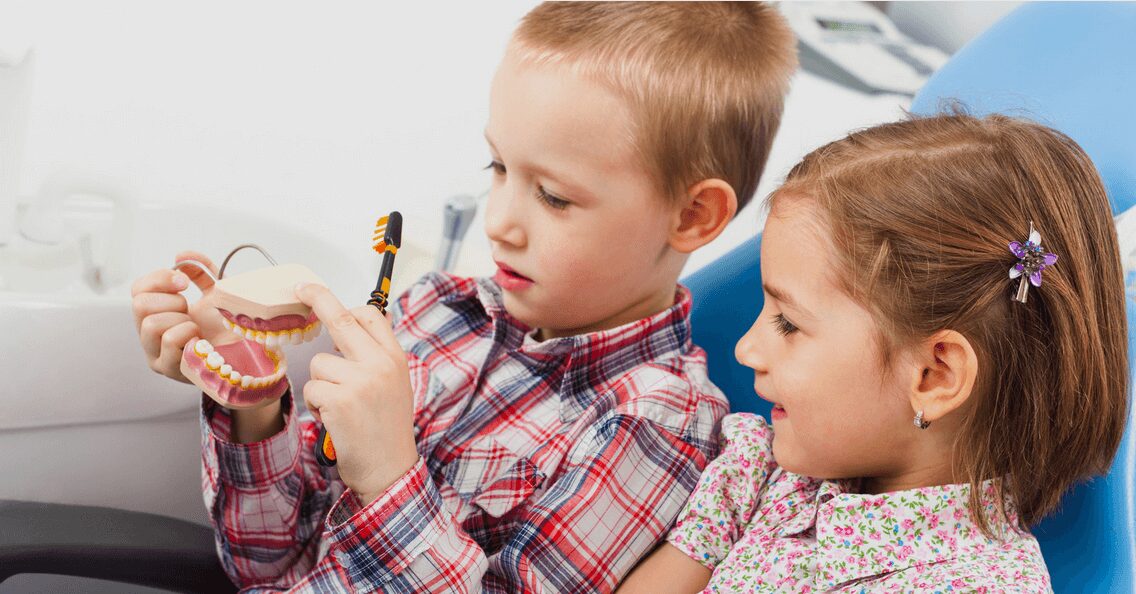Taking your child to the dentist for the first time can be a milestone filled with anxiety, questions, and often a significant amount of unknowns for parents. However, this pivotal moment lays the groundwork for a lifetime of dental health and hygiene habits. To help you understand this experience, this blog addresses common concerns and misconceptions and provides insights. From understanding the best age for that initial appointment to navigating the emotional landscape accompanying it, we aim to equip you with the knowledge needed to approach your child’s first dental visit confidently. Join us as we peel back the curtain on what dentists wish every parent knew, aiming to transform uncertainty into preparedness, fostering an environment where children can approach dental care with curiosity rather than fear.
What Happens During Your Child’s First Dentist Visit
Your child’s first dentist visit is primarily about acquaintanceship and comfort. Typically, it involves an office tour to familiarize the child with the environment. The dentist performs a gentle examination of the child’s teeth and gums to assess growth and health, looking out for any early signs of potential issues. This visit might include a simple cleaning procedure and teaching the child and parents about proper oral hygiene practices. The interaction is kept light and engaging, introducing dental tools and methods in a friendly way.
Normal Behaviors of Children
Parents must understand that children’s reactions to their first dental visit vary widely, from curiosity and excitement to apprehension and fear. Some children may be comfortable and cooperative, while others may cry or refuse to sit in the chair. These behaviours are entirely normal and to be expected. Dental professionals are trained to handle these reactions with patience and empathy, ensuring the child feels safe and supported throughout the visit.
The Goal of Your Child’s First Dentist Visit

The fundamental goal of the first dental visit is not intensive treatment but to build a foundation of trust and comfort between the child, the dentist, and the dental environment. Establishing this positive relationship early on is crucial for encouraging lifelong dental health. Through this initial experience, children learn that the dental office is not a place to fear but a place where they are cared for and their oral health is prioritized. Ensuring the first visit is a positive experience sets the tone for future interactions and helps to instill healthy dental habits early in life.
Preparing For Your Child’s First Dentist Visit
Preparing your child for their first dental visit is pivotal in ensuring the experience is perceived positively, laying the groundwork for a lifetime of stress-free dental care. Here are some strategies to introduce the concept of visiting the dentist in a friendly and reassuring manner:
Discussing the Dentist with Your Child
When talking about the dentist, emphasize the positives. Use simple words to describe how the dentist helps keep our teeth healthy and strong, making eating and smiling more enjoyable. Avoid using words invoking fear, such as “pain” or “needle.” Instead, focus on the benefits and the interesting aspects, such as the dentist’s tools and the chair that moves up and down.
Role-playing Exercises
Simulating a dental visit at home can demystify the process for your child. You can take turns playing the role of the dentist and the patient with your child, using a flashlight to examine teeth and pretending to clean them with a toothbrush. Such role-playing makes the idea of a dental visit more familiar and can also be a fun bonding activity. Encourage your child to ask questions and express concerns during these role-play sessions.
By approaching the topic of dental visits in a positive, engaging way and utilizing resources and role-playing exercises, you can significantly reduce any anxiety your child may feel and make their first dental visit a positive, memorable experience.
What to Bring on Your Child’s First Dentist Visit
For many parents, knowing what to pack for their child’s first dental visit can be as confusing as the visit itself. To ensure a smooth and stress-free experience, here’s a helpful checklist of items to bring along:
Documentation
- Health Records: Bring any health records that can provide the dentist with a comprehensive view of your child’s overall health, including any medications they are currently taking.
- Insurance Information: If you have dental insurance, remember to bring your insurance card or related documents. This will simplify the filing process for any claims or help you understand what services are covered.
Comfort Items
- Favourite Toys or Blankets: A familiar object can provide a great deal of comfort to a child in new or potentially intimidating settings. Whether it’s a favourite toy, a blanket, or even a book, bringing something your child finds comforting can make the dental office seem less daunting.
- Headphones and Music or Videos: For children who might be particularly anxious or sensitive to new environments, headphones with their favourite music or videos can help distract them and be positively associated with their dental visit.
A List of Questions or Concerns
- Oral Habits: Be ready to discuss your child’s oral habits with the dentist, such as thumb sucking, use of pacifiers, or any difficulties with brushing and flossing.
- Medical History: It is crucial to share a comprehensive medical history with your dentist, including any allergies or previous medical treatments, to ensure your child receives the best care possible.
- Concerns: If you have any specific concerns about your child’s teeth, mouth, or reaction to dental visits, write them down. This ensures you won’t forget to address them and helps the dentist understand and cater to your child’s needs.
Preparing for your child’s first dental visit by gathering necessary documentation, bringing comfort items, and having a list of questions or concerns can significantly contribute to a positive and effective dental experience. Remember, this visit is as much about building a foundation of trust and comfort as it is about dental care, so anything contributing to a calm and reassuring environment is worth considering.
Importance of Early Preventive Care
Early preventive care is instrumental in mitigating serious dental issues later. These visits allow dentists to guide parents on proper oral hygiene practices for their children, recommend dietary changes to prevent cavities and apply preventative treatments such as fluoride varnish or dental sealants to protect young teeth. Early dental visits also help children become accustomed to the dentist’s office, reducing fear and anxiety about dental care. By debunking common myths and emphasizing the importance of early and regular dental checkups, we can better protect our children’s dental health and overall well-being.
Tips For Your Child’s Oral Health
Maintaining a consistent oral health routine from an early age is foundational in fostering lifelong dental hygiene and preventing dental issues. Here are some strategies to nurture healthy oral habits in children:
Routine is Key: The Importance of Establishing a Dental Routine Early On
Setting a daily dental care routine is critical for children. This includes brushing teeth at least twice daily with fluoride toothpaste and flossing once daily. Introduce these habits to their daily activities, like eating and sleeping. Making oral care a fun and engaging part of their day, such as using toothbrushes featuring their favourite characters or flavoured toothpaste, can motivate children to maintain these habits.
Dietary Tips: Advice on Foods and Habits that Promote Healthy Teeth
A balanced diet plays a significant role in oral health. Encourage a diet rich in fruits, vegetables, and water while limiting sugary snacks and drinks, which can lead to cavities. Promoting healthy eating habits not only supports dental health but general health as well. Educate your child about the impact of various foods on their teeth to encourage mindful eating.
Avoiding Scare Tactics
Using the dentist as a scare tactic can create unnecessary fear and anxiety about dental visits in children, potentially affecting their perception of dental care for years to come. Instead, dental visits should be framed as positive, necessary parts of maintaining health, similar to visits to a pediatrician. Reinforce that the dentist is a friend who helps keep their teeth healthy and strong. This approach fosters a positive attitude towards dental care and professionals, making dental visits a less stressful experience for both children and parents.
After Your Child’s First Dentist Visit
Once the first dental visit is over, parents might wonder what comes next. Understanding the post-visit process and observing your child’s reactions are crucial steps in continuing to support their oral health.
What to Expect and When to Schedule the Next Appointment
After your child’s initial dental visit, the dentist will likely recommend a follow-up schedule. Dental check-ups are advised every six months for most children to monitor development, prevent dental problems, and apply preventive treatments as needed. However, the dentist might suggest a different schedule based on your child’s oral health status. It’s important to adhere to these recommendations to ensure your child’s teeth develop healthily and remain cavity-free.
Observing Reactions: Handling Post-Visit Discomfort or Anxiety
It’s normal for some children to experience discomfort or anxiety after their first dental visit, especially if preventive treatments like fluoride applications or dental sealants are applied. Reassure your child that these feelings are temporary and will subside. Simple pain relief methods like a cold compress or over-the-counter children’s pain medication (following the dentist’s advice) can be beneficial if your child expresses discomfort. Continuous support and reassurance help any lingering anxiety about future visits.
Reinforcing Good Habits
The first dental visit is an excellent opportunity for children to learn the importance of teeth care. Reinforce the dentist’s advice at home by:
- Practicing Dental Hygiene: Encourage your child to brush and floss as shown by the dentist. Make it a fun and integral part of their daily routine.
- Healthy Eating: As advised by the dentist, remind your child about the significance of eating nutritious foods for strong teeth. Involve them in choosing and preparing teeth-friendly foods.
- Regular Checkups: Stress the importance of regular dental visits to stay healthy, just like the first one they experienced. Marking the calendar for their next appointment can make it something to look forward to rather than fear.
By following these post-visit steps and observations, parents can actively ensure their child’s dental visit is just the beginning of a lifetime of good oral health habits.
Conclusion
Your child’s first dentist visit is crucial. It teaches them how to care for their teeth and shows them that going to the dentist is good. Dentists give tips on eating right for healthy teeth and making dental care a routine. Ensuring kids see the dentist as friends helps them feel more comfortable and confident about dental visits. This first visit isn’t just about checking teeth; it’s also about learning and starting good habits early. It helps kids and their parents understand how important dental health is and sets them up to take care of their teeth for life.
Parents, it’s simple: take your kids for regular dental check-ups. It’s essential for keeping their teeth healthy, preventing problems, and teaching them to care about their oral health. Following the dentist’s advice will help start a lifetime of good dental habits.





